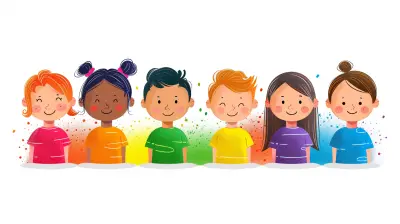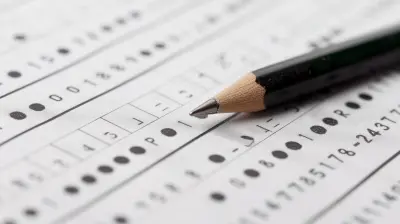12 January 2025
Communication is the foundation of all human interaction, whether in personal relationships or professional environments. But how do we truly master effective communication? One approach that has been gaining traction in educational circles is Project-Based Learning (PBL). It's not just about learning facts and figures; it's about developing life skills, especially communication. But what makes PBL so unique in nurturing these skills? Let’s dive in and explore how effective communication skills are honed through PBL.

What is Project-Based Learning (PBL)?
Before we go any further, let’s clarify what PBL actually is.Project-Based Learning is a teaching method where students actively engage in real-world and personally meaningful projects. Instead of merely sitting in a classroom and absorbing information, students work on projects that typically span weeks or even months. These projects are designed to solve a real-world problem, answer a complex question, or tackle a challenge that stimulates critical thinking, collaboration, and communication.
Now, you might be wondering, "How does working on a project improve communication skills?" Great question! Let’s break it down.

Why Communication is Crucial in Today’s World
Let's not sugarcoat it—communication is everything. From the workplace to your social life, being able to express your thoughts clearly and listen to others is key to thriving. Without effective communication, even the best ideas can get lost in translation. Whether you're a student preparing for a future career or a professional climbing the career ladder, your ability to communicate can make or break opportunities.Think about it: Have you ever had a brilliant idea but didn't know how to explain it effectively? Or maybe you’ve been in a group where everyone was talking, but no one was truly listening? These are common situations where communication either helps or hinders success. And this is exactly where PBL steps in to help refine those skills.

How PBL Enhances Communication Skills
1. Collaboration and Teamwork
One of the core elements of PBL is teamwork. Students are often placed in small groups where they must work together to complete a project. This collaborative environment forces individuals to communicate. It’s not just about talking; it’s about listening, negotiating, and compromising.Let’s face it—working in a group can be challenging. Everyone has different ideas, work styles, and opinions. But through these challenges, students learn how to articulate their thoughts clearly and respectfully. They also learn how to listen actively, which is a key component of effective communication.
Imagine being in a group where everyone is talking but no one is truly listening. It's pure chaos, right? PBL teaches students to avoid that chaos by encouraging open dialogue and active listening. In the process, they learn how to provide constructive feedback, ask clarifying questions, and resolve conflicts—skills that are crucial in any professional setting.
2. Presentation Skills
In PBL, students often have to present their findings or solutions to an audience. This could be their classmates, teachers, or even industry professionals. These presentations require students to organize their thoughts, structure their arguments, and convey their message clearly and confidently.Public speaking can be intimidating, but PBL provides a safe space to practice these skills. Students get the chance to rehearse, receive feedback, and improve with each presentation. Over time, they become more comfortable speaking in front of others, which boosts their confidence and increases their ability to communicate effectively.
It’s like riding a bike—the more you do it, the better you get. And just as you wouldn’t expect to master cycling without a few wobbles, developing strong presentation skills through PBL takes time and practice.
3. Problem-Solving Discussions
At its core, PBL revolves around solving problems. But here’s the thing: solving problems isn’t a solo activity. It requires brainstorming, evaluating different perspectives, and sometimes even debating the best course of action.These discussions are gold mines for enhancing communication skills. Students learn how to express their ideas clearly and back them up with evidence. They also learn how to challenge others’ ideas respectfully and engage in constructive dialogue. These discussions mirror real-world scenarios where professionals must collaborate to solve problems.
Think about it this way: When you’re working on a project at your job, you don’t sit in a room by yourself and come up with all the answers, right? You collaborate with your team, and those problem-solving discussions are where the magic happens.
4. Feedback and Reflection
In PBL, feedback is essential. Whether it’s from peers, teachers, or external audiences, students receive feedback throughout the project. But here’s the kicker—it's not just about receiving feedback; it’s also about giving it.Learning how to give constructive feedback is a communication skill in itself. Instead of simply saying, “That’s wrong” or “I don’t like that,” students are encouraged to provide specific, actionable feedback. This not only helps their peers improve but also sharpens their own communication skills.
Additionally, reflection is a key component of PBL. At the end of a project, students are often asked to reflect on their experience, including how they communicated with their team. This self-assessment fosters awareness of their communication strengths and areas for improvement.
5. Adapting to Different Audiences
In PBL, students are often required to present their projects to different audiences, ranging from their peers to external stakeholders like community members or professionals in a particular field. Each audience requires a different style of communication.For example, when presenting to classmates, students might use more informal language and focus on making the content relatable. However, when presenting to industry professionals, they might adopt a more formal tone and emphasize data and evidence.
This adaptability is a crucial aspect of effective communication. Understanding your audience and tailoring your message accordingly is a skill that’s highly valued in both personal and professional settings.
6. Written Communication
While much of PBL focuses on verbal communication, written communication is equally important. Throughout the project, students may need to write reports, proposals, or even emails to external collaborators.Writing in PBL is not just about grammar and punctuation (though those are important!). It’s about clarity, persuasion, and tone. Students must learn how to organize their ideas logically, use persuasive language, and communicate their points succinctly and effectively.
In today’s digital age, where emails and instant messaging often take the place of face-to-face conversations, strong written communication skills are more important than ever.

Real-World Application of Communication Skills Through PBL
Let’s take a moment to think about how these communication skills translate to the real world.Whether you're an engineer, a teacher, a manager, or an entrepreneur, you’ll need to communicate effectively. In the workplace, collaboration is key. You’ll need to work with colleagues from different departments, explain complex ideas to clients, and present your findings to upper management. PBL prepares students for these real-world scenarios by giving them the tools to communicate clearly, listen actively, and present confidently.
Think of PBL as the training ground for communication skills. The more you practice in a controlled environment, the more prepared you’ll be when it’s time to step into the real world.
Conclusion: Communication Skills for Life
In a world that’s becoming increasingly interconnected, effective communication skills are more important than ever. Project-Based Learning offers a unique and powerful approach to developing these skills. Through collaboration, presentations, problem-solving discussions, feedback, and reflection, PBL helps students become confident and effective communicators.So, if you’re looking to enhance your communication skills, whether you’re a student or a professional, consider embracing the principles of PBL in your learning or work environment. After all, communication isn’t just a skill—it’s the key to success in nearly every aspect of life.












Isaiah Warner
This article highlights an intriguing approach! I’m curious how PBL specifically enhances communication skills compared to traditional learning methods.
February 8, 2025 at 10:01 PM